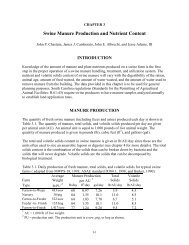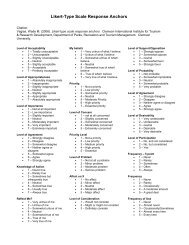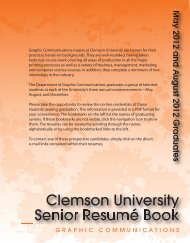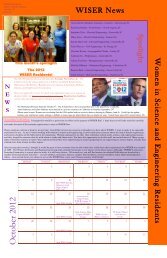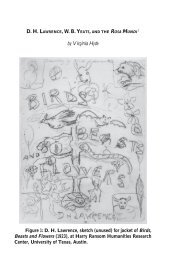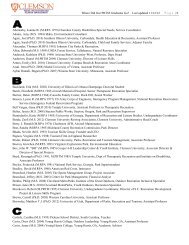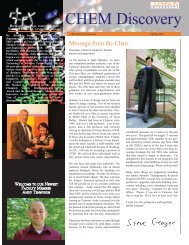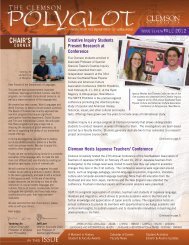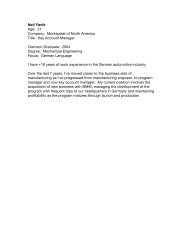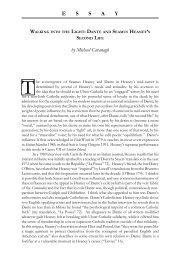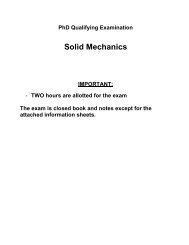Woolfian Boundaries - Clemson University
Woolfian Boundaries - Clemson University
Woolfian Boundaries - Clemson University
You also want an ePaper? Increase the reach of your titles
YUMPU automatically turns print PDFs into web optimized ePapers that Google loves.
Woolf’s Transformation of Providential Form<br />
119<br />
celebration of life at the novel’s end, Septimus too endures.<br />
I contend that Clarissa’s fi nal vision at the novel’s end off ers a response to Bradshaw’s<br />
judgment of Septimus at the novel’s middle not only through Clarissa’s approval of Septimus’s<br />
suicide, but also through the scene’s setting at midnight. Th is midnight timing<br />
highlights how Clarissa’s vision affi rms life in answer to Bradshaw’s noon condemnation<br />
of it. In Providential form, since noon marks the presence of Christ-come-in-judgment,<br />
midnight marks the absence of such, and thus potentially the absence of meaning. Just as<br />
Woolf subverts the form at noon by exchanging the roles of judger and judged, she subverts<br />
it at midnight by granting Clarissa an affi rmative vision. While in Providential form, noon<br />
marks the coming of Christ, who from a Christian perspective, gives life all its meaning,<br />
in Mrs. Dalloway, midnight marks Clarissa’s triumphant revelation that people give life its<br />
meaning. What prompts this revelation is Clarissa’s seeing that “in the room opposite the<br />
old lady stared straight at her” (157). Clarissa has seen this lady earlier in the novel: “Why<br />
creeds and prayers and mackintoshes? When, thought Clarissa, that’s the miracle, that’s<br />
the mystery; that old lady” (108). Septimus, right before his suicide, has seen a very similar<br />
sight: “He did not want to die. Life was good. Th e sun hot. Only human beings? Coming<br />
down the staircase opposite an old man stopped and stared at him. Holmes was at the<br />
door. ‘I’ll give it you!’ [Septimus] cried” (127, emphasis added). Septimus then leaps out<br />
the window to his death. Th ese passages show the diff ering spiritualities of Clarissa and<br />
Septimus. Septimus’s faith is not grounded on normal human interaction. Septimus does<br />
not fi nd in the old man the humanistic faith that Clarissa fi nds upon seeing the old lady.<br />
Clarissa, though she bears much affi nity with Septimus, is sane. Her faith is grounded on<br />
experience interacting with other people. Hers is the faith in humanity Septimus might<br />
have had if the war had not distorted it for him, and “human nature”—Holmes, in the<br />
passage above, and Bradshaw at noon—confi rmed this distortion.<br />
Th e old lady represents Clarissa’s and, I believe, Woolf’s own faith in humanity and<br />
rejection of faith in a Christian God. So when Clarissa sees the woman again at the novel’s<br />
end, she again celebrates the miracle and mystery of humanity:<br />
In the room opposite the old lady stared straight at her! She was going to bed. And<br />
the sky.… It was new to her [i.e. Clarissa].… She was going to bed in the room opposite.…<br />
She pulled the blind now. Th e clock began striking. Th e young man had<br />
killed himself; but she did not pity him; with the clock striking the hour, one, two,<br />
three, she did not pity him, with all this going on. Th ere! Th e old lady had put out<br />
her light! Th e whole house was dark now with this going on, she repeated, and the<br />
words came to her, Fear no more the heat of the sun. She must go back to them.<br />
But what an extraordinary night! She felt somehow very like him—the young man<br />
who had killed himself. She felt glad that he had done it; thrown it away. Th e clock<br />
was striking. Th e leaden circles dissolved in the air. (157)<br />
Although Woolf does not say outright that this vision occurs at midnight, the triple mention<br />
of the clock’s striking recalls the triple mention of Big Ben striking at noon. Nowhere<br />
else in the novel does the clock’s striking merit three mentions. Further, the fact that Clarissa<br />
exults when “Th e old lady had put out her light!” and “Th e whole house was dark”<br />
(158) shows that total darkness, often associated with the midnight hour, is complicit



